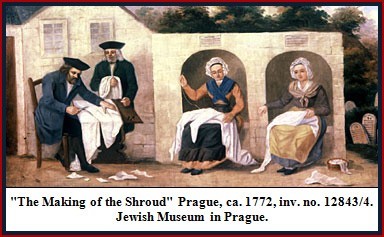
Some information in this article is of a sensitive nature.
In Judaism there it is part of our halachic tradition (Jewish law) that we care for the body of someone who has passed. The source for this comes from Kohelet 5:14, "As we come forth, so we shall return." After death, the body is washed, dressed in a white shroud, and watched over until the funeral. This work used to be exclusively the work of volunteers, and in Ottawa, it remains that way.
The Chevra Kadisha (Holy Society) is often shrouded in secrecy, so let’s lift the veil. The Midrash tells us that Moses merited that G-d personally tend to his burial because Moses himself took care of the remains of Joseph and ensured they were taken out of Egypt and reinterred in Israel.
The modern understanding of a Chevra Kadisha has been in place since Talmudic times. In Europe of yesteryear, it was an honour to be a member of the Chevra Kadisha, and great Torah scholars and communal leaders were admitted to this society as a mark of distinction. 
Today, there is nothing secretive about their work, only that it frequently happens during the night, in silence, with only the sound of Tehillim (Psalms) being heard. Members of the Chevra Kadisha do not often speak of their work. It is one of the biggest mitzvot (good deeds) a person can do for another because they cannot be thanked for it.
The E-Bulletin met with Anna Silverman who works at Hulse, Playfair, and McGarry Funeral Home and is the lead volunteer for the Chevra Kadisha of Ottawa. She discussed that each body they work with is treated with respect and dignity. That Halacha dictates how to prepare a body for burial and that they treat everyone the same. The rituals are the same whether the person was wealthy or poor, contributed to the community or kept to themselves, “we are all equal in death,” says Silverman.
Each body is washed and cleaned in a process called Tahara. The body is then dressed in a fully white cotton shroud called tachrichim and is never left unattended until it is placed in the ground. Tehillim and prayers are said throughout the process and the dignity of the person is never compromised. Only men will work with male bodies and women with female bodies. Jewish bodies are not embalmed.
Silverman notes that the Chevra Kadisha works with funeral homes and prepares the bodies but is not a funeral home itself.
The work of the Chevra Kadisha has been a little more out in the open since the start of the war with Hamas. Rabbi Idan Scher from Congregation Machzkei Hadas explains, “In Israel, where terror has become an unfortunate part of everyday life, ZAKA is a Chevra Kadisha that specializes in retrieving and caring for the remains of the victims of suicide bombings and other violent acts. They go to great lengths to ensure that every drop of blood is collected and buried in the most honourable fashion.” In addition, they will attempt to identify and match all parts to the person so the body can be buried whole.
Rabbi Scher continues, “Since October 7, ZAKA’s work has been nothing short of heroic. They have sacrificed so much to ensure that every precious human being is treated with the utmost dignity. They have worked nonstop for the last eight weeks throughout the South of Israel, encountering the most horrific sights one can imagine, to make sure that every Jew receives as much of a burial and as much respect as possible.”
ZAKA’s work also reaches well beyond Israel. In 2005, ZAKA was recognized by the United Nations as an international volunteer humanitarian organization, and it is often called upon to assist other countries following disasters.
Our Ottawa Chevra Kadisha is proud to be one of the few fully volunteer groups left in North America. As such, they are always looking for new members. They understand that seeing dead bodies is not a typical part of our tradition so many are hesitant to become involved. Our Chevra Kadisha has a training program to introduce volunteers to the different tasks. There is no requirement to work directly with the dead. Specifically, they need people to help sew the Tachrichim (shrouds) and to be attendants at the funeral. They understand that many people work during the day and are unable to attend daytime funerals, but many of their seasoned members are older and leave town for the winter. Since there is an obligation to stay with the body until it is buried, there are always members of the Chevra Kadisha at funerals and they need help.
If you are interested in becoming involved in the Ottawa Chevra Kadisha, visit ottawachevrakadisha.ca. You can also call or email Anna Silverman at 613-293-1003 or [email protected] or Issie Scarowsky at 613-261-7294 or [email protected].
